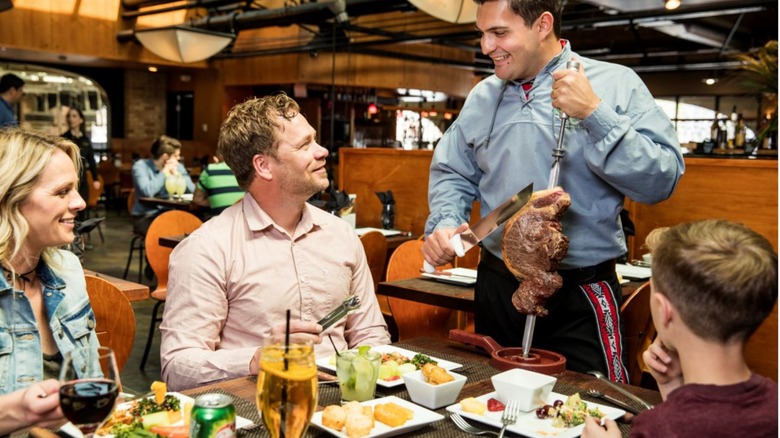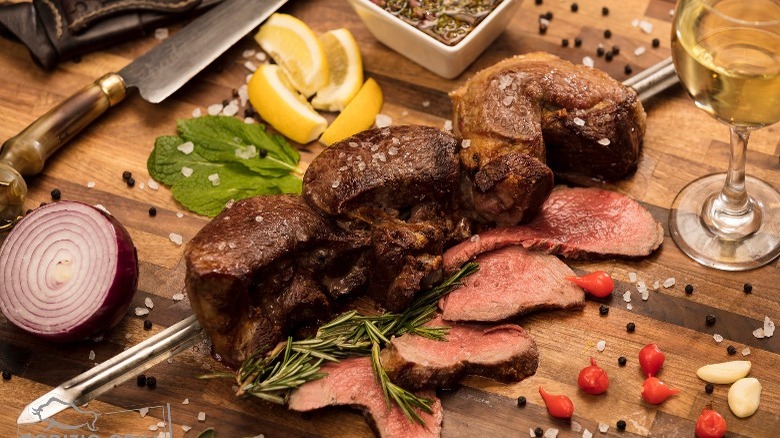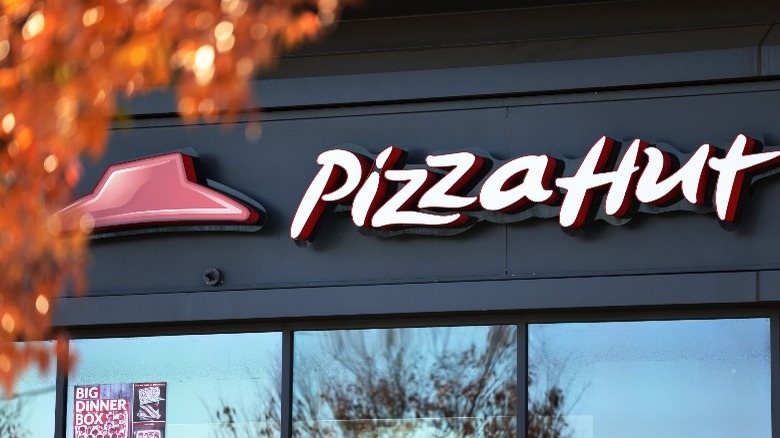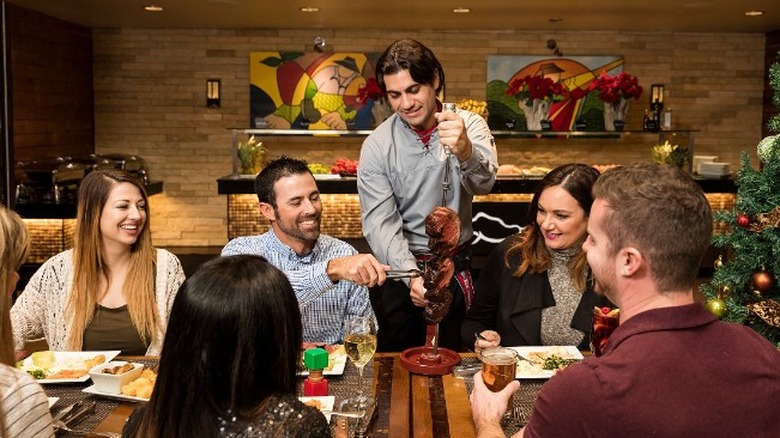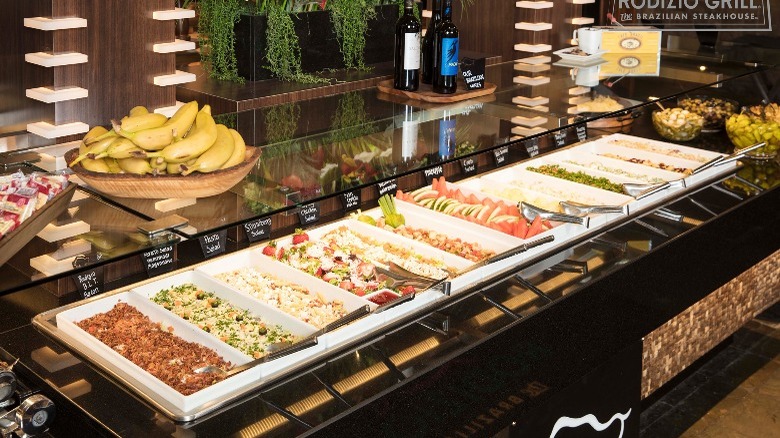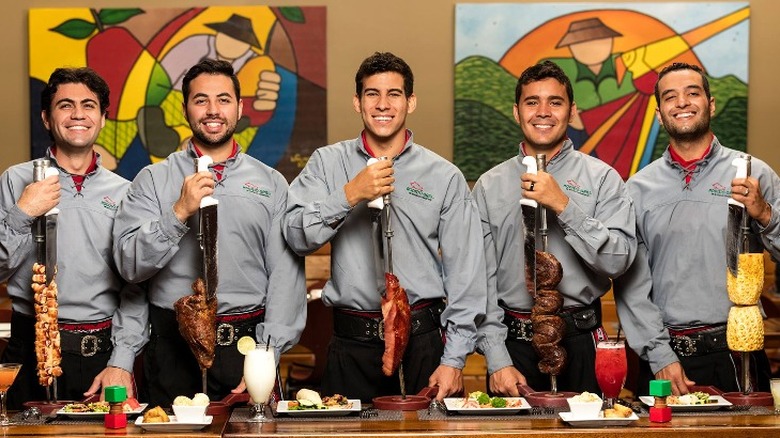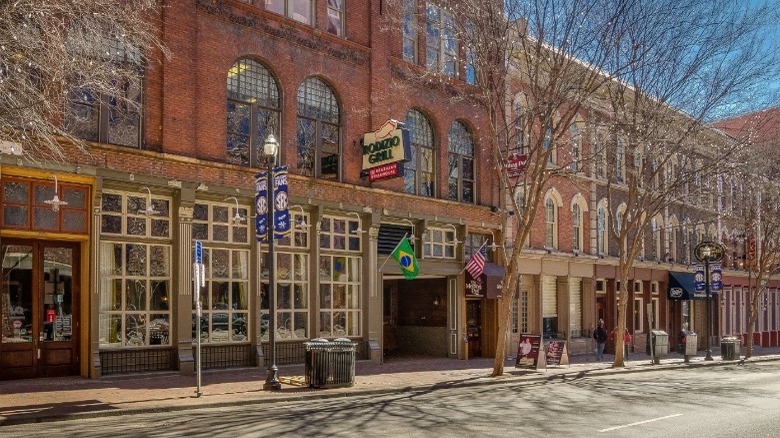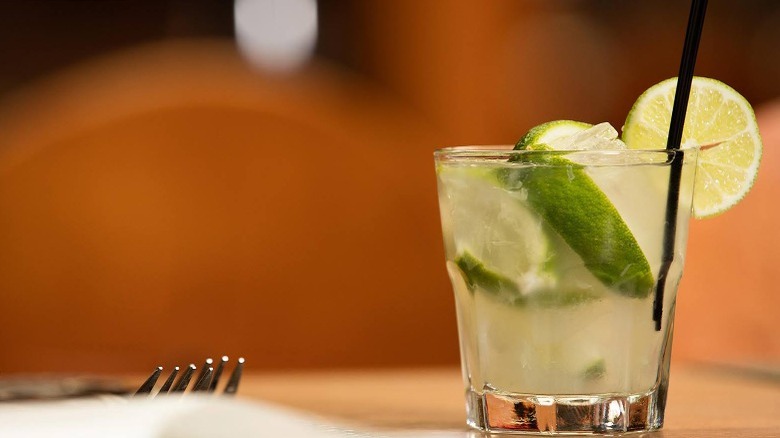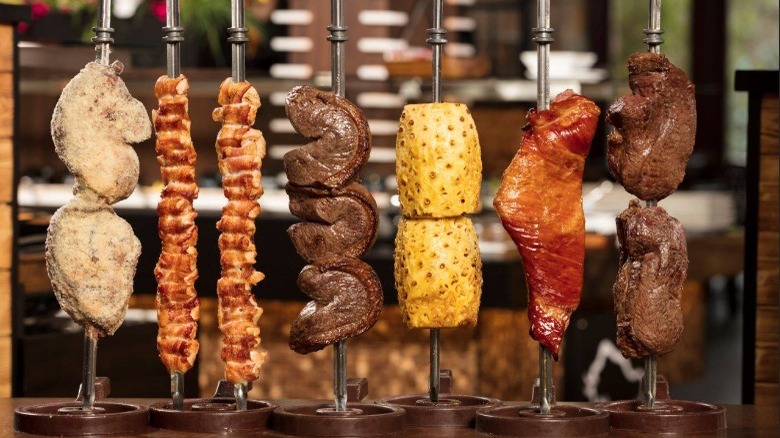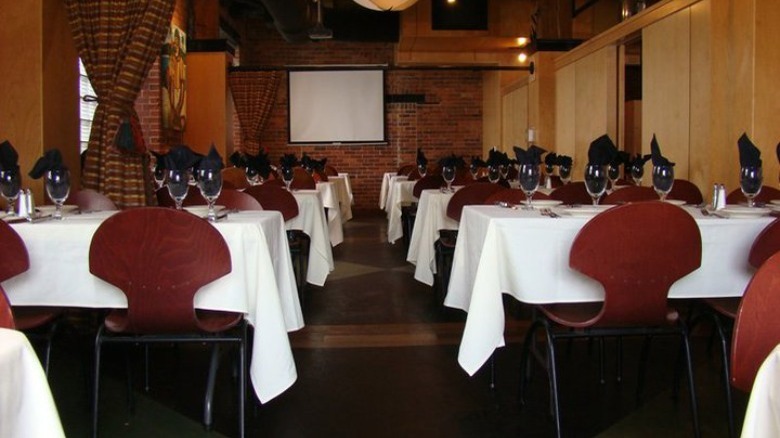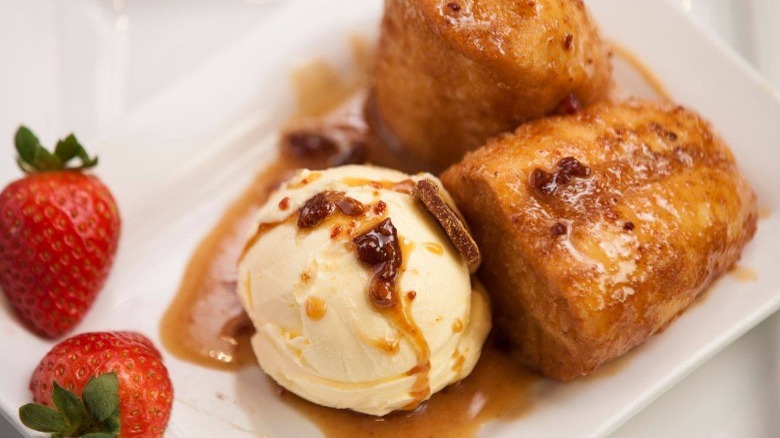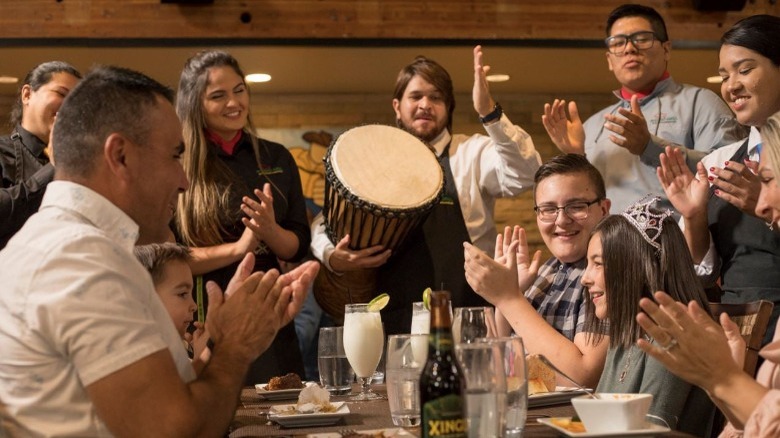The Untold Truth Of Rodizio Grill Brazilian Steakhouse
Dining at Rodizio Grill Brazilian steakhouse is not for nibblers. With unlimited appetizers, a salad bar, and grilled meat cooked in a way that the cowboys of Brazil used to do a century ago, it's not surprising to know that this place is preferred by the brawny sportsmen of the Nebraska Cornhuskers and Denver Broncos. Here, you can learn all about the taste of a grilled chicken heart and the meaning of the word "gaucho." You come out of the restaurant armed with a slightly better understanding of Brazilian culture, not to mention a ready-to-explode belly. That's exactly what the founder Ivan Utrera had envisioned when he started the steakhouse back in the '90s. "[...] one of my goals is to bring a little more knowledge about Brazil into the U.S.," he told Latin Trade.
Utrera had started the first location in Denver, a place with a low Brazilian population that he deemed a challenge. Not only did they succeed there, but the restaurant has also expanded to almost 20-odd locations across the United States (via Rodizio Grill). Here's the untold truth of Rodizio Grill Brazilian Steakhouse, which arguably came onto the scene before all other Brazilian steakhouses in the US.
It claims to be the first Brazilian steakhouse in the US
The first Rodizio Grill Brazilian Steakhouse opened in 1995, in the town of Littleton, Colorado (via Restaurant News). The restaurant chain went on to be recognized as one of the fastest-growing private companies in Denver in 1999 (via Denver Business Journal). The concept that allowed diners to eat unlimited meat for a fixed price was, no wonder, a hit. In the years following Rodizio Grill's launch, a bunch of similar concept restaurants mushroomed across the country, bringing South American-inspired cookery to American customers. Churrascaria Plataforma opened in New York City in 1996, Fogo de Chão opened in Dallas in 1997, and Texas de Brazil in Addison, Texas a year later.
If these openings were jotted down on a timeline, it might appear as if Rodizio Grill kick-started it all. But, though the restaurant chain has stood the test of time, things haven't been perfect. Its first Littleton location closed a decade after its opening, once its lease expired.
The founder was once an employee of Pizza Hut
Before starting a Brazilian steakhouse in the United States, Rodizio Grill founder Ivan Utrera used to oversee the expansion of Pizza Hut stores across Brazil, Latin America, and the US (via Latin Trade). Utrera had earned a degree in Communications from Brigham Young University in Provo, Utah, and later went on to earn his Masters in Business Administration from Brigham Young's Marriott School of Management. All his family members were entrepreneurs — his parents ran a business that made plastic components for phones and washing machines, and some of his distant family members ran restaurants in Brazil. What really pushed Utrera into starting something of his own was the lack of satisfaction at his corporate gig.
He told Latin Trade that "It got really stifling [...] If you wanted to do anything, [even] change the color of the napkins, you needed two years worth of research to see if it was going to impact anything." He quit the company and raised $1 million in funds with help from his friends, family, and Pizza Hut franchises to start his Brazilian steakhouse business venture. Utrera had noticed that steakhouses had become the new hot thing in Brazil. Why not see if the same trend could be replicated for hungry North American diners as well?
'Rodizio' is a serving style
In Brazil, "rodizio" is a style of service where waiters go around the restaurant wielding skewers of grilled meat. When requested, they simply slice a portion of it onto your plate. Under this style, you pay a fixed price for your meal, but there is no limit to the amount of meat you care to eat. At Rodizio Grill, each diner is given a small signal known as a "cue," as per News-Press. The wooden cue's green side is a signal for the servers to come to your table with the meat. If the cue is placed with its red face pointing up, then it is a signal to let them know you have had enough for now.
This style of dining, per Eater, originated in Southern Brazil. However, no one restaurant, in particular, can claim to have invented the style. That said, some believe that the rodizio style was born out of a mistake. As the story goes, a waiter in a Brazilian restaurant took the meat skewer to the wrong table, but the guests there didn't mind trying it anyway.
This helps to explain why, at Rodizio Grill, you don't usually order your preferred meat. Instead, waiters just bring you a variety of cuts to try. Rodizio-style eateries peaked in the 20th century, during a period of expansive roadwork construction in Brazil, as Eater notes. Grilled meat was a convenient, filling, and nutritious food to keep large groups of laborers happily fed.
Rodizio Grill is vegetarian friendly
While the meat selection is undoubtedly the highlight at Rodizio Grill, the steakhouse also offers plenty of vegetarian options for the herbivores amongst us. For example, their salad bar boasts a wide selection, many of which, according to the Lincoln Star Journal, have no meat and are gluten-free. Though the salad items vary based on the season and the location, the common vegetarian food options include fruit, hearts of palm, quinoa, pickled beet salad, kale salad with lemon, and more (via Rodizio Grill). That's not all — the appetizers include a gamut of vegetarian-friendly options such as cinnamon glazed bananas, banana fritas, fried corn sticks, Brazilian cheese bread, and small rolls (via Latin Trade).
At the steakhouse, you can choose whether to have the combo of salad, appetizers, and meat, or opt to go with just the salad bar for a much cheaper rate, according to Lincoln Star Journal. It must be noted that the salad bar, while being a vegetarian's heaven, also includes items such as beef stroganoff, quail eggs, and more. But above all, you can confidently walk in with your vegetarian appetite knowing that there is an unlimited amount of grilled pineapple slices waiting for you.
The steakhouse celebrates Brazilian gaucho heritage
At Rodizio Grill, waiters are often dressed as "gauchos," or Brazilian-style cowboys (via Rodizio Grill). As history goes, back in the 1900s, a large number of people had migrated from Europe to Southern Brazil and set up colonies in the fertile lowlands of the vast pampas plains. Here they raised cattle and invented a clever way of grilling the meat — one that required them to dig a hole in the ground where they could start a fire that wouldn't be utterly destroyed by the ever-present wind. The method stuck and is the main inspiration behind the Rodizio Grill's offerings (via Rodizio Grill).
According to Rodizio Grill, founder Ivan Utrera was exposed to this traditional style of grilling meat as a kid. As per the tradition, the gauchos took up the job of burning wood and grilling the meat for all during get-togethers. Usually, they had a knife attached to their belt, which they used to carve pieces of meat into everyone's plate.
Traditional gaucho garb, as mentioned on How Stuff Works, includes a style of baggy pants, knwon as bombachas, along with hats and boots. Though you may not see bombachas at Rodizio Grill, its serfers also often sport a gaucho's classic red scarf around their necks as part of the staff uniform. This, according to Churrasco Shop, is reminiscent of the tradition that the gauchos followed while fighting for Southern Brazil's independence back in the day.
One of its locations was destroyed by a bomb
Rodizio Grill was one of the 41 businesses that were damaged in a shocking bombing incident on the morning of Christmas 2020 in downtown Nashville, Tennessee. As per Nation's Restaurant News, the bomber made an announcement through a loudspeaker, asking people to vacate the area before detonating the explosive from a vehicle. In the process, he killed himself, injured three others, and destroyed a number of nearby buildings. These included the historic 160-year-old building which was home to a Rodizio Grill. The damage was so extensive that it was deemed unsafe for the employees to return and the franchise owners declared it temporarily closed. As per the Rodizio Grill Nashville's Facebook page, there are no updates as to when it would reopen again.
Soon after the tragic incident, a GoFundMe page was started to raise funds to rebuild the restaurant. Iy brought in a little over $50,000. The incident was a big blow for franchise owner Carla Rosenthal, who was mostly concerned about employees who were already hit hard by the COVID-19 pandemic and the restrictions it placed upon the restaurant industry. However, Rosenthal spoke for the entire team when she said, "[We're] restaurant people. We will persevere" (via Nation's Restaurant News).
The steakhouse serves traditional Brazilian dishes
The restaurant's menu includes a mix of Utrera's unique family recipes and those he developed on his own. As it turns out, Utrera's mom, Carmen, used to work as a culinary teacher in Brazil and helped gather the family recipes. What's more, she even travels to the United States every two years to ensure that the restaurant keeps her family's tradition alive (via Rodizio Grill). To that end, the menu includes authentic Brazilian dishes such as banana fritas, an appetizer that is a popular side dish in Brazil, according to Sabor Brasil. At Rodizio Grill, you could also order pao de queijo, a traditional Brazilian cheese bread made using tapioca flour (via South Jersey Magazine).
As if that weren't enough, you get to nosh on Fraldinha, a style of beef tender popular in Southern Brazil, or Coração de Frango Temperado Rabanada (chicken hearts), which is also a common appetizer in Brazilian steakhouses (via Rodizio Grill). Wash them down with a caipirinha, a Brazilian cocktail made with sugarcane-derived spirits. Rodizio also serves linguica, a spicy Portuguese sausage, and picadinho chili, a traditional gaucho stew (via Rodizio Grill).
When Utrera started the restaurant, he was criticized for not offering the usual sides, such as mashed potatoes and salads, on the menu, as he told Latin Trade. Utrera tweaked the menu in a way that it made space for all those items beloved by American diners, while also maintaining the feel of more traditional Brazilian foodways.
Rodizio Grill has struggled financially
Just like many other restaurants, Rodizio Grill had a tough time coping with the financial strain brought by the COVID-19 pandemic. But the situation was particularly challenging for the steakhouse because it didn't have a model suitable for to-go orders. After all, the restaurant's unique selling point is serving customers hand-carved meat. But with frequent bans on indoor dining, steakhouse locations were earning a measly $700 per week on to-go orders, which wasn't enough to even cover a location's utility bills (via Restaurant Hospitality).
Though the Paycheck Protection Program established by Congress did help cover the employees' salaries, Utrera blamed the Colorado governor Jared Polis for laying down the "strictest" COVID restrictions for restaurants compared to other States. The biggest blow, per Utrera, was when the state went on lockdown in December 2021, during the Omicron wave. The steakhouse had spent a ton on marketing and was just beginning to break even, when Colorado restaurants were asked to close again. "[Nobody] is doing anything to help us in Colorado," he said.
This is not the first time the steakhouse has had money issues. In 2002, when it only had five locations, the company filed for Chapter 11 bankruptcy, as per Denver Business Journal. The factors behind the filing included plummeting sales, a poor economy, and $600,000 spent on a lawsuit, which had put the steakhouse in the dire financial situation.
Some locations also double up as an event space
Most Rodizio Grill locations have an event space that you can rent for wedding receptions, corporate luncheons, or office parties, as per Rodizio Grill. For example, the banquet hall in the Rodizio Grill Ice House building located in downtown Denver can accommodate about 75 guests, while the one in Salt Lake City can seat as many as 150 (via Wedding Spot). If planning an event, the restaurant team even will even assist you with the layout and audio/visual needs, not to mention the all-important food and drinks.
As if that weren't enough for most folks, the location in Salt Lake City has a Meeting and Celebration Center which can be either used as a big hall accommodating around 275 people or divided into three smaller rooms. As a reminder of its Brazilian roots, the rooms are named after the famous rivers of Brazil, namely the Copacabana, Ipanema, and Leblon (via Salt Lake Bride). The rental fee, per Wedding Spot, varies according to the specific location. The banquet hall in the Ice House Building location can technically be rented for free, though there is a per-person cost for food and beverages. Meanwhile, the banquet hall in Rodizio's Trolley Square location in Salt Lake City costs $500 for two hours.
It raises funds to support breast cancer survivors
Rodizio Grill's classic rabanada, the Portuguese-style version of French toast, is sweet for more reasons than one. The funds raised from the sale of this dessert at the Rodizio Grill have in the past gone towards the Image Reborn Foundation, an organization that empowers breast cancer survivors by offering them healing retreats at zero cost, per a press release from the restaurant itself. These weekend retreats, which happen in Park City, Utah, include practices such as massage therapy, journaling, education on breast cancer, exercise, and healthy meals. It's all meant to improve the lifestyle of women who have experienced breast cancer.
The nationwide fundraiser happens annually in October (which happens to be Breast Cancer Awareness Month). Besides raising over $21,000 through its rabanada sales, the restaurant has also held an art auction to benefit the foundation in 2014. In 2018, the total donation amounted to over $46,000 (via Rodizio Grill). Rodizio Grill has been sponsoring the foundation since its inception in 2000, according to the restaurant's press release. Ivan Utrera, the founder of Rodizio, and Dr Renato Saltz, the Brazilian plastic surgeon who is the founder of Image Reborn Foundation, are close friends who also share Brazil as a native country.
Birthdays are a big deal at Rodizio Grill
While most restaurants give you freebies and a song on your birthday, like a dessert at Cracker Barrel or a limited number of wings at Hooters (via Insider), Rodizio Grill allows you to eat unlimited food for (almost) free on your special day. Well, it's actually a mere $1 charge for the person celebrating their birthday, with the purchase of one dinner, per a post on the restaurant's Facebook page. This is a neat offer, given a full Rodizio meal which includes sides, salads, and meats, comes to $32.99 for dinner, per the restaurant's website.
To access this offer, one must become a Rodizio Club Member by signing up on the website. The birthday offer can be claimed anytime between five days prior to and 14 days after the birthday (via Rodizio Grill). But besides the free birthday dinner, the restaurant staff will also likely sally forth with drums and chants in celebration of the birthday-haver, according to The Enquirer.
What that really means is that a team of restaurant staff will come to your table and sings "Parabéns," the Portuguese version of the more commonly known (at least in the US) "Happy Birthday" song. One of them may play the djembe, an African percussion instrument that can be used to play Brazilian samba (via Facebook). With the djembe and the loud claps, it's perfect for anyone who likes a bit of a to-do on their birthday.
